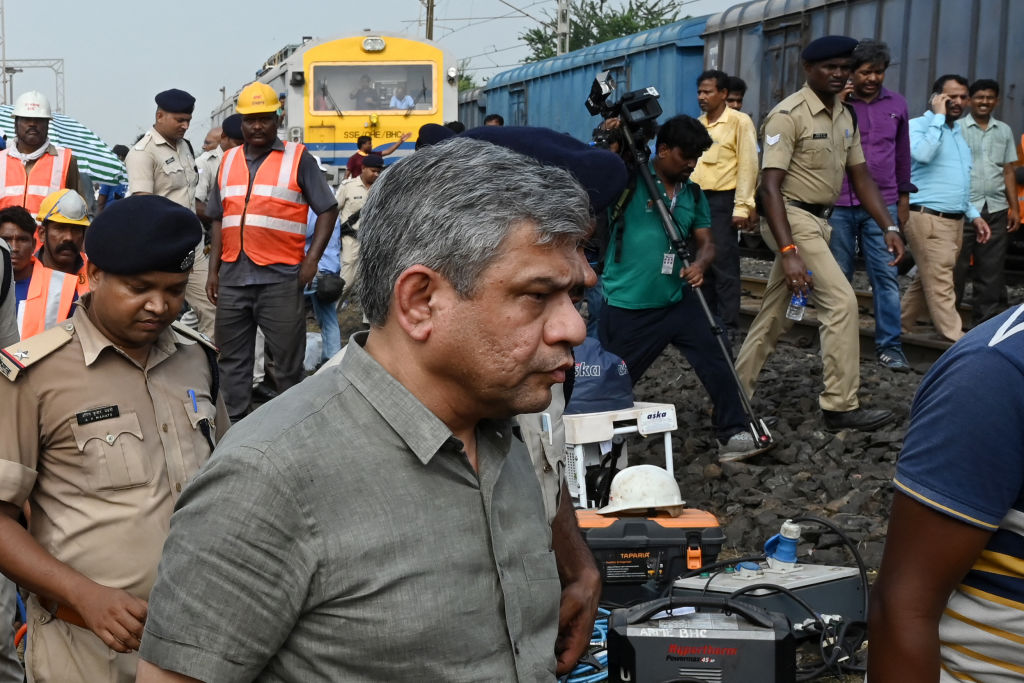- Thursday, April 24, 2025
Nitish Kumar also resigned as the railway minister following a deadly train crash in the eastern state of West Bengal in 1999.

By: Shubham Ghosh
As Twitter was abuzz with demands for resignation of India’s railway minister Ashwini Vaishnaw after a collision between three trains, including two passenger ones, in Balasore in the eastern state of Odisha left several hundreds dead and injured, people recalled two instances in history of independent India when two railway ministers stepped down following disasters on tracks.
In the first instance, it was former Indian prime minister Lal Bahadur Shastri, who had resigned as the railway minister in November 1956, less than a decade after India became independent, after 144 people were killed in a train accident at Ariyalur in the then Madras state in the south (today’s Tamil Nadu) when several coaches had fallen into a river after the bridge over which it the train was travelling collapsed.
#BalasoreTrainAccident On November 23, 1956, a train accident happened at Ariyalur in Madras State, leaving 144 people dead. Lal Bahadur Shastri, railway minister, resigned, stating ‘it will be good for me and the Government as a whole, if I quietly quit the office I hold.’ 1/3 pic.twitter.com/Ilp0VrwKiH
— N.S. Madhavan (@NSMlive) June 3, 2023
Shastri, who would go on to become India’s second prime minister in 1964 after the death of Jawaharlal Nehru, had said then that it would be good for him and the government as a whole if he quietly quit.
A copy of Shastri’s resignation letter was also shared on Twitter.
1956 :: Resignation Letter of Railway Minister Shri Lal Bahadur Shastri After Ariyalur Train Accident
( Photo – PM Museum ) pic.twitter.com/LuNGxDa88G
— indianhistorypics (@IndiaHistorypic) June 2, 2023
The second Indian politician who resigned as the railway minister following a deadly crash was Nitish Kumar, the current chief minister of the eastern state of Bihar who has expressed grief after the latest incident. In August 1999, Kumar stepped down as the prime minister from the government of then prime minister Atal Behari Vajpayee after two trains collided in Gaisal in northern West Bengal, resulting in deaths of 285 people.
Mamata Banerjee, the current chief minister of West Bengal, had also tendered resignation after two train accidents in December 2000 but Vajpayee, who was also the prime minister then, refused to accept it.
In August 2017, Suresh Prabhu offered to resign as the railway minister after taking moral responsibility for two instances of train derailments but prime minister Narendra Modi asked him to wait. Prabhu stepped down the next month.
The Twitterati accused the Indian Railways of promoting luxury trains and not basic safety and security and sought resignations over deaths.
A responsible railway minister would pay attention to basic safety and security before showing off luxury trains only 10% population can afford.
When you fail and hundreds of humans are killed, take responsibility and resign. https://t.co/HlpgIpV18N
— Subhashish (@subhapa) June 3, 2023
However, there were also netizens who backed Vaishnaw and asked him to continue as the railway minister.
This is for those asking for the resignation of #AshwiniVaishnaw . Get a replacement like this to head the behemoth of a ministry and I will support you. His work speaks for itself … @AshwiniVaishnaw MUST not resign but fix the culprits who are responsible. Even sabotage.. pic.twitter.com/MAvy5DV1oT
— VINOD KUMAR ? (@veekay122002) June 3, 2023
There were also others who said while prime minister Modi takes the credit whenever something new happens in the railways, it is the railway minister who comes under the scanner when an accident takes place.
A man who races for all laurels, glam & photoshoots will never be seen ever when mishaps happen.
India learns that #AshwiniVaishnaw is the railways minister only now.
Nation thought it was Modi who had that portfolio. #Modi_Hatao_Desh_Bachao
BJP is all about electioneering. ? pic.twitter.com/31E9Fc8TK0— Pragnya Gupta (@GuptaPragnya) June 3, 2023